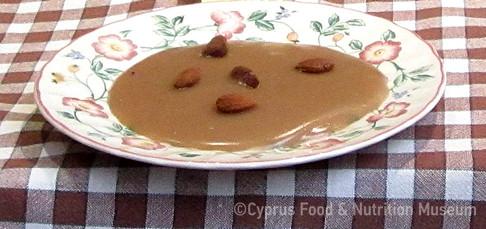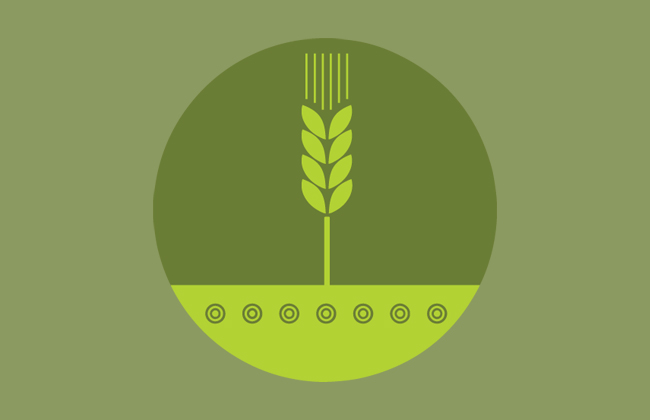A type of gruel.
Name - Origin
It was a type of soup made with flour and water (Yangoullis 2009, entry γρούτα,η, 128; Kypri 1989, entry γρούτα,η, 20; Kypri - Protopapa 2003, 269-270) / gruel (Petrou-Poeitou 2013, entry Γρούτα 39; Yangoullis 2009, entry γρούτα,η, 128) / grape must paste (Yangoullis 2009, entry γρούτα,η,128; Kypri 1979 [2002²], entry γρούτα,η, 122).
ETYM. < ancient greek γρύτη (gríti) (Yangoullis 2009, entry γρούτα,η, 128), medieval Latin grutum (Yangoullis 2009, entry γρούτα,η, 128; Petrou-Poeitou 2013, entry Γρούτα, 39)
The word grouta is derived from the word γρύτη (griti), which is a small and useless waste, because it is made from flour and useless grape must and epsima. It seems, however, that it also derives from the word γρυτ, the sound while stirring this preparation, as is the corresponding French word crotte, which means clay, mud (Kypri 1979 [2002²], entry γρουτα,η, 122).
In other villages, such as Rizokarpaso, they would first heat the oil, fry pieces of bread, add water and when it was hot, they would add flour or semolina and mix it until it became like gruel. In other instances, instead of bread, they would fry chopped onions. In Kalograia village, they would add small pieces of pasta to the oil, instead of bread. Another variation of grouta was made in Hartz̆ia village, where a bit of coarse wheat was boiled along with the flour. In Assia village, it is mentioned that they used to boil water with flour and add rose water and sugar. In villages that had epsima (grape syrup) available, people would prepare grouta with flour and epsima (Kypri - Protopapa 2003, 269-270).
Functional and symbolic role
Grouta was usually prepared in the morning and was the family's breakfast (Kypri - Protopapa 2003, 270). It was also a snack consumed at any time by deprived families (Kyprianou 1992, 70).
Additional information and bibliography
A similar dish to grouta is simithkiá, which is prepared either on its own or with koukkourouthkia, i.e. fried pieces of bread. They boil vermicelli or bulgur wheat and then add flour and boil them together until they become gruel (Kypri - Protopapa 2003, 270).
Ancient people used to call grouta by the name of "athari" and, for its preparation, they would use peeled wheat or barley boiled in milk. They also used to call it poltó, which was a broth made with flour and fat (Kypri 1979 [2002²], entry γροῦτα,η, 122).
Yangoullis K. G. (2009), Θησαυρός Κυπριακής Διαλέκτου. Ερμηνευτικό, Ετυμολογικό, Φρασεολογικό και Ονοματολογικό Λεξικό της Μεσαιωνικής και Νεότερης Κυπριακής Διαλέκτου, Βιβλιοθήκη Κυπρίων Λαϊκών Ποιητών, Theopress Publications, Nicosia.
Kypri Th. D. (ed.) (1979 [2002²]), Υλικά διά την σύνταξιν ιστορικού λεξικού της κυπριακής διαλέκτου, Μέρος Α΄, Γλωσσάριον Γεωργίου Λουκά, Publications of the Centre for Scientific Research, XLI, Nicosia.
Kypri Th. D. (ed.) (1983 [2003²]), Υλικά διά την σύνταξιν ιστορικού λεξικού της κυπριακής διαλέκτου, Μέρος Β΄, Γλωσσάριον Ξενοφώντος Π. Φαρμακίδου, Publications of the Centre for Scientific Research, IX, Nicosia.
Kypri Th. D. (ed.) (1989), Υλικά διά την σύνταξιν ιστορικού λεξικού της κυπριακής διαλέκτου, Μέρος Γ΄, Γλωσσάριον Ιωάννου Ερωτοκρίτου, Publications of the Centre for Scientific Research, XIV, Nicosia.
Kypri Th. - Protopapa K. A. (2003), Παραδοσιακά ζυμώματα της Κύπρου. Η χρήση και η σημασία τους στην εθιμική ζωή, Publications of the Centre for Scientific Research, XVIII, Nicosia, Nicosia.
Kyprianou P. Chr. (1992), «Λαογραφικά του Παλαίκυθρου», Λαογραφική Κύπρος 42 (supplement), 1-101.
Petrou-Poeitou E. (2013), Από πού κρατάει η σκούφια τους. Λέξεις και ιστορίες από τον κόσμο της γεύσης, Epiphaniou Publications, Nicosia.
Varvara Yangou, Demetra Demetriou, Tonia Ioakim, Argyro Xenophontos

